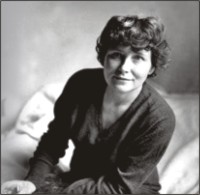| Author Profile

Mohammad Shahidul Islam
 After lots of speculations and speculative London betting on the outcome, Doris Lessing("The Golden Notebook", 1962), the London-settled novelist has won the 2007 Nobel Prize in Literature on Thursday 11th October. After lots of speculations and speculative London betting on the outcome, Doris Lessing("The Golden Notebook", 1962), the London-settled novelist has won the 2007 Nobel Prize in Literature on Thursday 11th October.
Broadcasting the award in Stockholm, the Swedish Academy illustrates her as “that epicist of the female experience, who with skepticism, fire and visionary power has subjected a divided civilization to scrutiny.” The award comes with a 10 million Swedish crown honorarium, about $1.6 million. Ms. Lessing, who rolls on 88 later this month, never crossed high school and largely educated herself through voracious reading. She has written dozens of books of fiction, as well as plays, nonfiction and two volumes of autobiography. She is the 11th woman to win the Nobel Prize in Literature. Lessing has been named a potential candidate over the last 40 years - so long in fact, that she herself once exclaimed: "I'll never get it". Finally she has conquered the highest recognition of noveling.
Considered a significant writer of the post-World War II generation, Lessing has explored many of the most significant ideologies and social issues of the twentieth century. Her prolific body of work displays many interests and concerns, ranging from racism, Communism, and feminism, to psychology and mysticism. Lessing began her career in the 1950s, writing realist fiction that focused on themes of racial injustice and colonialism. As her writing developed, Lessing began to compose fiction that anticipated many major feminist concerns of the late 1960s and 1970s. Her strong-willed, independent heroines often suffer emotional crises in male-dominated societies and must struggle with dominant sociopolitical constructs to reach higher levels of identity and liberation. A consistent theme cultivated throughout her work is the need for individuals to confront their fundamental assumptions about life in order to transcend preconceived belief systems and acquire self-awareness.
Life Sketch:
Lessing was born in Persia (now Iran) to English parents who moved their family to Rhodesia (now Zimbabwe) in the hopes of successful farming. She was educated in a convent school and later a government-run all-girls school, but her formal education ended at the age of thirteen. A voracious reader, Lessing had excelled in school and continued her education by reading the wealth of books her mother ordered from London. By the age of eighteen, Lessing had written two drafts for novels and was selling stories to South African magazines, although she would not publish her first novel, The Grass Is Singing, until 1950. In 1939 she married Frank Wisdom, a much older man with whom she had two children. The marriage, which lasted four years, inspired A Proper Marriage (1954), considered one of her most acutely autobiographical novels. Lessing joined the Communist Party in the early 1940s and also met and married Gottfried Lessing, a Jewish German with whom she had a son, Peter. In 1949 the couple separated, and Lessing and Peter moved to England. In London, Lessing established herself as a fiction writer, critic, journalist, and political activist. Though she severed her ties to the Communist party in the mid-fifties, in 1956 she was banned from returning to Rhodesia, presumably for anti-apartheid sentiments expressed in her writings. Although details of Lessing's personal life are limited, critics agree that her fiction draws significantly from her own experiences. Lessing continues to live in England.
[Mohammad Shahidul Islam studied English at University of Chittagong, Email: mohd-s-islam@myway.com ]
Copyright
(R) thedailystar.net 2007 |
